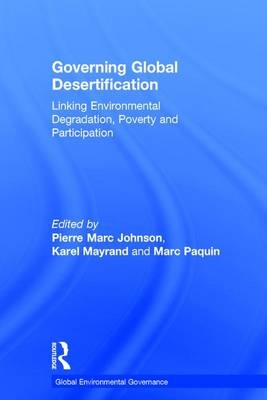
Governing Global Desertification
Routledge (Verlag)
978-1-138-27812-7 (ISBN)
Dr Pierre Marc Johnson has been counsel to Heenan Blaikie, Canada, since 1996. He is advisor to various international institutions, including the Commission for Environmental Cooperation (NAFTA parallel institution) and the UNCCD Secretariat. He has also chaired Committees of the Conference of Parties of the UNCCD and has mediated Convention related issues between OECD and developing countries in the last decade. Karel Mayrand is co-founder and Director of Research at Unisféra International Centre, Canada - an independent, not-for-profit research centre on sustainable development policy and law. He also lectures on environment and international development issues at the Université de Sherbrooke, Canada. His fields of expertise are trade policy and the environment, agricultural policies, rural development and desertification. Marc Paquin is a lawyer and MBA specializing in international and comparative environment and sustainable development law and policy. He is the co-founder and Executive Director of Unisféra International Centre, Canada and is also a lecturer at the Université de Sherbrooke, Canada. Throughout his career Mr Paquin has worked on various assignments for governments, intergovernmental organizations and the private sector.
Contents: Preface; The United Nations Convention to combat desertification in global sustainable development governance, Pierre Marc Johnson, Karel Mayrand, and Marc Paquin; The scientific basis: links between land degradation, drought and desertification, Stefanie M Herrmann and Charles F. Hutchinson; Examining the links between poverty and land degradation: from blaming the poor towards recognising the rights of the poor, Sally-Anne Way; Desertification and migration, Michelle Leighton; Negotiating desertification, Adil Najam; The United Nations and the fight against desertification: what role for the UNCCD Secretariat?, Steffen Bauer; Civil society's role in negotiating and implementing the UNCCD, Friederike Knabe; Promoting good governance through the implementation of the UNCCD, Lene Poulsen and Masse Lo; The global mechanism and UNCCD financing: constraints and opportunities, Francois Falloux, Suzanne Tressler, and Karel Mayrand; Decentralisation and sustainable resources management in West Africa: a line of action for revisiting national action programmes, Richard Pearce; Knowledge and the UNCCD: The community exchange and training programme, Noel Oettle; Agriculture, trade, and desertification: implications for UNCCD, Karel Mayrand and Marc Paquin; Conclusion: the UNCCD at a crossroad, Pierre Marc Johnson, Karel Mayrand, and Marc Paquin; Appendix: United Nations convention to combat desertification in those countries experiencing serious drought and/or desertification, particularly in Africa; Bibliography; Index.
| Erscheinungsdatum | 14.05.2017 |
|---|---|
| Reihe/Serie | Global Environmental Governance |
| Verlagsort | London |
| Sprache | englisch |
| Maße | 156 x 234 mm |
| Gewicht | 453 g |
| Themenwelt | Naturwissenschaften ► Biologie ► Ökologie / Naturschutz |
| Sozialwissenschaften ► Politik / Verwaltung ► Europäische / Internationale Politik | |
| Technik ► Umwelttechnik / Biotechnologie | |
| ISBN-10 | 1-138-27812-2 / 1138278122 |
| ISBN-13 | 978-1-138-27812-7 / 9781138278127 |
| Zustand | Neuware |
| Haben Sie eine Frage zum Produkt? |
aus dem Bereich


